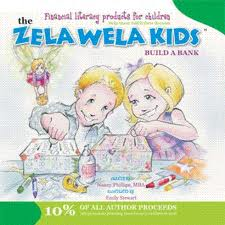Book Review – The Zela Wela Kids Build A Bank by Nancy Phillips, MBA
 In Build A Bank, the first book in the Zela Wela Kids series, the main characters, twins Emma and Jack learn the importance of allocating their money for specific purposes. With the help of their mother and teacher they create banks for giving, investing, saving and spending the money they receive.
In Build A Bank, the first book in the Zela Wela Kids series, the main characters, twins Emma and Jack learn the importance of allocating their money for specific purposes. With the help of their mother and teacher they create banks for giving, investing, saving and spending the money they receive.
There are many things to enjoy about the book. The main message of allocating money is nicely explained with the added bonus of the children making their own money boxes. Each element of giving, investing, saving and spending are explained in child friendly terms.
As the author is Canadian, there are a few references to dollars and cents, but readers in the UK and elsewhere can still enjoy sharing these messages with their children. There are also some nice multi cultural references.
The book is beautifully illustrated and 10% of all author proceeds are donated towards providing books to children in need.
About the author
Nancy Phillips was born and raised in Toronto, Ontario, Canada, the fifth largest city in North America. Nancy has an Honors Bachelor of Science from the University of Guelph and an Executive Master of Business Administration degree from Queens University, Canada. She has twenty years of business management experience including roles in new product development, portfolio management and international marketing. Nancy was a national award- winning sales representative for Bayer Pharmaceuticals in Canada and went on to successfully manage a $40 million international orthopedic product line while working in San Diego.
The birth of her first child in 2002 dramatically changed Nancy’s life and some of her primary goals. After becoming a mother, she had a new focus—teaching her children the skills they would need to thrive in our rapidly changing world. Just before her eldest turned five, she began searching for a comprehensive book series that would teach her children important lessons about personal finance and goal setting. Although many of the books she read had excellent information, it was generally directed towards adults not children. This led to the creation of The Zela Wela Kids™.
Two specific incidents that occurred when Nancy was young significantly impacted her outlook on money management. One day when Nancy was nine years old, Barbara, one of her mother’s friends, came to the house crying. After she left, Nancy asked her mom why Barbara had been crying. Her mother told her that her friend had lost her husband several weeks earlier. Barbara’s husband had been the one responsible for paying the bills and investing for their retirement. Now that he was gone, Barbara was devastated and had no idea what to do. This experience had a major impact on young Nancy. She made a vow to never let this happen to her.
Then, when Nancy was twenty-one, she met a wonderful family. The eldest child, who was only a few years older than Nancy, had purchased a cute house. When Nancy asked her how she could afford to buy such a great place at such a young age, she informed Nancy that she had saved the down payment by setting aside 30% of every paycheck she had received since becoming a real estate agent several years earlier. She said that she didn’t miss the extra money and was accustomed to living on 70% of her paycheck. This made a lot of sense to Nancy, so when she began her own career, she started depositing 30% of her paycheck into a separate account, giving 10% to charity, and living on the remaining 60%. By following this system, she, too, was able to buy her first home in her twenties.
Nancy’s mission is to help create a financially literate society by providing children and young adults with resources that encourage a basic understanding of personal finance and the process of goal achievement. She hopes that by talking about these important subjects, parents and children alike will be inspired to develop responsible financial habits that will increase their quality of life and enable them to achieve their true potential.
More information can be found at www.zelawelakids.com
Build A Bank can also be found on Amazon
 Do you know how many countries around the world use the term dollar as their currency?
Do you know how many countries around the world use the term dollar as their currency?





